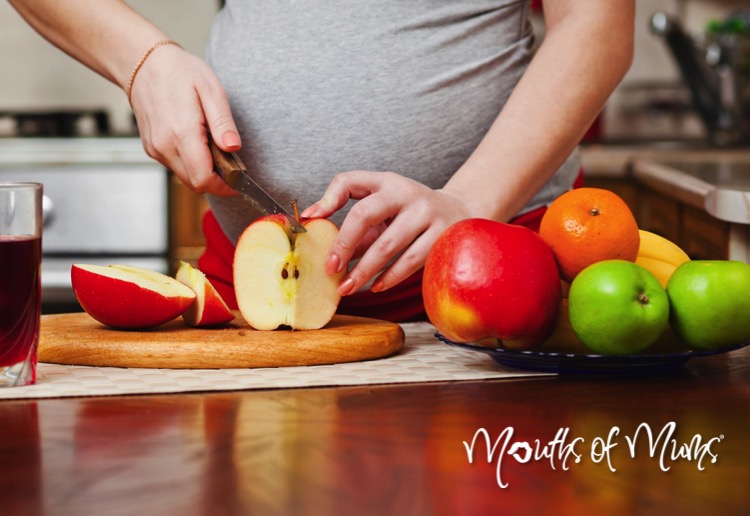As I near the finish line of my second pregnancy, I thought it fitting to write about my knowledge and experiences when it comes to “eating for two.”
I find there are three common approaches to eating during pregnancy:
1) The over-indulger
Women who see pregnancy as an excuse to over-indulge and literally eat enough calories for two. These women enjoy pints of Ben and Jerry’s Ice Cream on the couch every night, send their husbands out in the middle of the night in search of Snickers and pizza, no longer substitute hot chips for steamed veggies and by 9 months find it perfectly normal to eat two pancake breakfasts from McDonald’s.
2) The over-analyser
Women who spend 9 months over analysing and worrying about everything they eat, due to fear of harming their unborn child. If the recommendation is to limit, or use in moderation, they avoid completely. By the end of their pregnancy they have themselves on sugar-free, gluten-free, lactose-free, animal products-free, seafood-free, anything processed-free, fried-free, non-organic-free, and of course caffeine and alcohol-free diets.
3) The poor souls
Terribly unlucky women who spend 9 months curled up in a ball on the bathroom floor begging the Lord above to make the nausea stop. They have food aversions to everything they once enjoyed, and are reduced to a diet of crackers, canned peaches and ginger ale. These women didn’t even have a chance to indulge or carefully calculate everything they ate during pregnancy, because the morning sickness (which actually lasts morning, noon and night and curse the man who came up with this name) never relented and if it did then they experienced severe heartburn, indigestion and constipation.
As a Dietitian and a Mum who has been pregnant for 18 of the past 24 months, I totally understand and applaud all of these women. I personally am a combination of all three types, a “Poor analysing indulger.” Once I was able to pick myself off the bathroom floor, deal with the relentless nausea and determine which foods didn’t make me sick to even think about; I made it my “job” to eat healthy and ensure my babies were getting all of the nutrition they needed; while still allowing myself to indulge from time to time. I did my best to follow the American and Australian Dietary Guidelines for pregnancy.
- Achieve and maintain a healthy weight, remain physically active and meet ones daily nutritional needs.
- Eat a variety of vegetables, fruit, whole grains, lean proteins and dairy daily.
- Limit intake of saturated fat, sugar and high salt foods.
- Avoid alcohol.
- Avoid foods which may contain listeria bacteria (unpasteurised soft cheeses, sandwich meats, bean sprouts and pre-prepared salads).
- Avoid raw eggs, due to risk of salmonella.
- Limit fish with high levels of mercury to 100g cooked per fortnight (shark, marlin, swordfish, orange roughy, and catfish).
One common misunderstanding among all women is the recommended daily calories required during pregnancy. At no point is it recommended to literally eat for two. In fact, there is more focus today on ensuring women don’t gain too much weight during pregnancy, due to the risk of gestational diabetes, gestational hypertension (high blood pressure), cesarean delivery, birth defects and even fetal death.
Here is a simple calculation used by Dietitians to determine ones non-pregnant daily calorie needs to maintain current weight:
Active individuals = 35 x weight in Kg = Total calories required per day
Non-active, sedentary individuals = 30 x weight in Kg = Total calories required per day
Question: Jane is planning to start a family in the next year, and wants to make sure she is healthy and fit before she gets pregnant. Jane does Pilates three times per week and runs 30 kilometers weekly. Jane currently weighs 60kg. How many calories does Jane need daily to meet her nutritional needs?
Answer: 35 x 60kg = 2,100 cal Daily
Below are the current guidelines from the Academy of Nutrition and Dietetics for weight gain during pregnancy, based on pre-pregnancy BMI’s, and the additional calories required during each trimester of pregnancy.[i]
BMI Chart:
- Underweight: <18.5
- Normal weight: 18.5 to 24.9
- Overweight: 25.0 to 29.9
- Obese: 30.0 and above
Recommended Weight Gain for Single Pregnancy:
- Underweight: 28 to 40 pounds
- Normal: 25 to 35 pounds
- Overweight: 15 to 25 pounds
- Obese: 11 to 20 pounds
Recommended Weight Gain for Twin Pregnancy:
- Normal: 37 to 54 pounds
- Overweight: 31 to 50 pounds
- Obese: 25 to 42 pounds
Additional Calories Required Daily During Pregnancy & Breastfeeding:
- 1st Trimester: 0 Additional Calories
- 2nd Trimester: 340 Additional Calories
- 3rd Trimester: 450 Additional Calories
- Breastfeeding: 500 Additional Calories
Question: Jane has just entered her 2nd trimester and is feeling great. She is still active doing Pilates, but has switched from running to walking. How many calories does Jane require at this point in her pregnancy?
Answer: 35 x 60kg + (340) = 2,440kcal Daily
Lots of women report ravenous appetites in their 1st trimester. Even though the guidelines don’t advice consuming additional calories at this stage in the pregnancy, my advice to these lucky women who escape morning sickness is to eat when they feel hungry, but make healthy, nutritious food choices to avoid excessive weight gain.
I personally had little appetite during my 1st trimester, and had to really make an effort to meet my daily calorie requirements. I got hit by all day morning sickness and relentless nausea. I was definitely a “Poor soul” in the beginning of both pregnancies and relied on the tips below to survive:
Tips for “Poor Souls:”
- Eat small, frequent meals.
- Avoid cooking or consuming foods with strong odours.
- Never allow yourself to get too hungry. Low blood sugar increases nausea and morning sickness symptoms. Crackers, dried fruit, muesli bars are some examples of good snacks to eat between meals.
- Drinks plenty of fluids.
The 2nd trimester is when most women start to feel great and have the “pregnancy glow.” This was definitely the case with my first pregnancy! At 14 weeks, I noticed a big increase in my appetite and had tons of energy. Since I had lost weight in my 1st trimester, due to nausea, lack of appetite and eliminating wine from my diet, I found myself leaning towards becoming an “Over-Indulger.” I felt I earned it and figured this was my chance to eat like a man! Sadly, I was still unwell at this stage during my second pregnancy and didn’t have as much fun.
Tips for “over-indulgers:”
- Monitor your weight and ensure you are staying within the current guidelines.
- Before indulging, make sure you are consuming the recommended daily servings of fruit, vegetables, lean proteins, dairy and whole grains.
- Follow the Australian Dietary Guidelines for Pregnancy, especially when it comes to avoiding foods that may cause food borne illness and avoiding the consumption of alcohol.
- Remember you will have to deal with the consequences of excess weight gain and bad eating habits after pregnancy!
Next comes the 3rd trimester. For many women this phase of the pregnancy can be even worse than the 1st trimester. Some may experience nausea, increased fatigue, restless leg syndrome, heartburn, constipation, back pain and insomnia. It is hard to believe you can get any bigger, but it’s in the final weeks of pregnancy that the bubs double and triple in size. This is why an additional 450 calories is needed daily. It’s recommended to consume small, frequent meals, since you will feel full sooner in the 3rd trimester and yet need the extra calories.
From the moment I found out I was pregnant, I diligently avoided soft cheeses, lunch meats, pre-prepared salads, fish with high levels of mercury, alcohol and limited my intake of caffeine. Even though I used to advice clients that an occasional glass of wine or serving of beer was fine during pregnancy, I decided to go without completely. (I have to admit, after back to back pregnancies and almost 24 months without getting to drink, I am really looking forward to a glass of wine!) I definitely took the cautious road when it came to what I ate and drank during pregnancy, and at times I was guilty of over-analysing. I always say the worst thing about being a Mum is the amount of worrying that comes with the job. All you want to do is keep your bubs safe, so if that means giving up wine with dinner, your favourite coffee, brie cheese, turkey sandwiches, etc. for 9 months well then so be it.
Tips for “over-analysers:”
- It’s okay to be cautious, and I recommend following the Dietary Guidelines for Pregnancy, but don’t eliminate food groups from your diet without consulting a health care professional. You may be eliminating essential vitamins and nutrients that will help your baby thrive.
- DO NOT GOOGLE!
Eating for two doesn’t end when the baby is born if you decide to breastfeed. As you can see, you require an additional 500 calories per day while breastfeeding (more calories than required at any stage during pregnancy). I couldn’t believe how hungry I was during the first few weeks of Austin’s life. I found I needed to eat every 2 to 3 hours. I was also surprised by how thirsty I was, especially when Austin would just start to feed.
According to the “Australian Breastfeeding Association,” when you breastfeed, your body is able to compensate for the extra demand of nutrients by using them more efficiently and causing an increase in appetite. We are to obtain the extra nutrients and energy needed by eating slightly more of the same foods we normally eat, by using up fat stores developed in pregnancy and by reducing the amount of energy we use. [ii]
Question: Jane had a beautiful baby girl and has chosen to breastfeed. She is enjoying taking the baby for walks in the pram each day, but is waiting 3 months before getting back into any major physical activity. How many calories does Jane require daily?
Answer: 35 x 60kg + (500) = 2,600kcal Daily
Tips for breastfeeding:
- Eat small, frequent meals to avoid going long periods of time without eating.
- Ensure you are eating a healthy, balanced diet rich in iodine, calcium and iron, since these are common nutrients of concern during breastfeeding.
- Iodine-rich foods include yoghurt, turkey breast, navy beans, tuna, eggs and baked potatoes.
- Calcium can be sourced from milk, yoghurt, cheese, leafy greens, legumes, etc.
- Iron is found in red meat, poultry, seafood, beans, dark leafy greens, iron-fortified cereals, etc.
- Pre-plan meals and snacks to avoid making unhealthy food choices.
- Avoid or limit alcohol, especially in the first 6 to 8 weeks until your baby gets on a more consistent eating schedule.
- Continue taking a prenatal or pregnancy multivitamin supplement to help meet the demand for additional nutrients.
- Have a drink ready to go every time you sit to feed to help with the increased thirst.
In closing, I hope this information helps you prepare for pregnancy, survive pregnancy, or look back on your pregnancy and reminisce about your own experience.
Since I have less than 3 weeks to go on my 2nd, and most likely my last, pregnancy, I am definitely going to savour the moment and enjoy splurging on some additional calories while I can!
Can you relate to the above? Please share in the comments below.
[i] http://www.eatright.org/resource/health/pregnancy/prenatal-wellness/healthy-weight-during-pregnancy[ii] https://www.breastfeeding.asn.au/bf-info/common-concerns%E2%80%93mum/diet





















-

-
-
mom94125 said
- 03 Sep 2016
-

-
-
mom101628 said
- 27 Aug 2016
-

-
-
june11 said
- 01 Jul 2016
-

-
-
mom183717 said
- 24 Jun 2016
-

-
-
BellaB said
- 14 Jun 2016
-

-
-
mum4107 said
- 14 Jun 2016
-

-
-
mom19782016 said
- 13 Jun 2016
-

-
-
mom160421 said
- 13 Jun 2016
-

-
-
Nas01 said
- 13 Jun 2016
Post a comment5:11 pm
11:57 pm
9:16 pm
9:11 pm
11:16 am
6:36 am
7:55 pm
1:08 pm
11:14 am
To post a review/comment please join us or login so we can allocate your points.